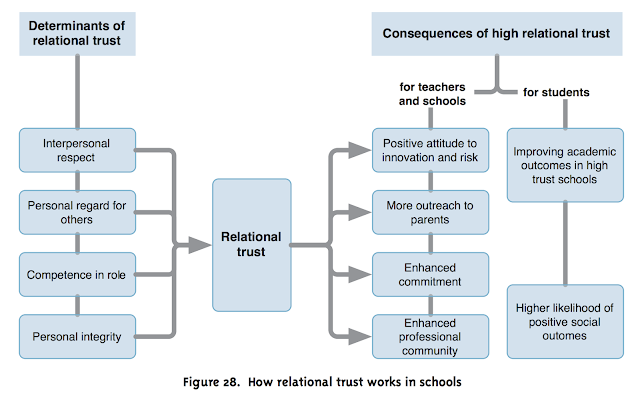Building and Sustaining Relational Trust
- What is relational trust and how is it developed?
Each party in a relationship maintains an understanding of his or her role's obligations and holds some expectations about the obligations of the other parties. For a school community to work well, it must achieve agreement in each role relationship in terms of the understandings held about these personal obligations and expectations of others. An interrelated set of mutual dependencies are embedded within the social exchanges in any school community. Regardless of how much formal power any given role has in a school community, all participants remain dependent on others to achieve desired outcomes and feel empowered by their efforts. As individuals interact with one another around the work of schooling, they are constantly discerning the intentions embedded in the actions of others. They consider how others' efforts advance their own interests or impinge on their own self-esteem. They ask whether others' behavior reflects appropriately on their moral obligations to educate children well. These discernments take into account the history of previous interactions. In the absence of prior contact, participants may rely on the general reputation of the other and also on commonalities of race, gender, age, religion, or upbringing.
- What conditions need to exist for trust to be built and sustained across teams?
These discernments tend to organize around four specific considerations: respect, personal regard, competence in core role responsibilities, and personal integrity. (Bryk & Schnieder, 2003).
The most import aspect of relational trust is respect. Respect involves recognising the importance of each person's role and that each person must depend on each other to play their parts. The best way to show respect for someone is to listen to their ideas as if they have value.
- What does research tell us about the importance of trust and leadership?
The quality of relationships makes a difference within a school community. Where trust has little or no visibility in a school, the school has no chance of improving. Schools with high trust have improved academic outcomes and positive social outcomes for students. Leaders are able to build and maintain networks of supportive yet challenging relationships beyond the organisation. Teams are more productive. Smaller schools develop a high trust among staff quicker and easier than larger schools.
- What theories and models of leadership might be useful in developing and sustaining trust across teams and individuals?
Peer coaching, mentoring, team teaching, professional learning communities, networking - these should not be linked to appraisal or performance reviews.
- What aspects of culturally responsive education relate to the development and sustaining of trust in leadership?
I think all aspects of relational trust relate to culturally responsive practices. The 5 key components relate directly and the general suggestions below basically underpin the 5 components. Without these, relational trust isn't present and unfortunately, culturally responsive practices is built on high trust.
References:
Brewster, C. & Railsback, J. (2003). Building trusting relationships for school improvement: Implications for principals and teachers. Northwest Regional Educational Laboratory. Retrieved from: https://educationnorthwest.org/sites/default/files/trust.pdf
O’Brien, D. (2011). How leaders develop and direct relational trust-building efforts in schools. Unpublished master’s thesis. University of South Australia. Retrieved from http:// search.ror.unisa.edu.au/media/researcharchive/open/9915951812201831/53111913050001831



Comments
Post a Comment